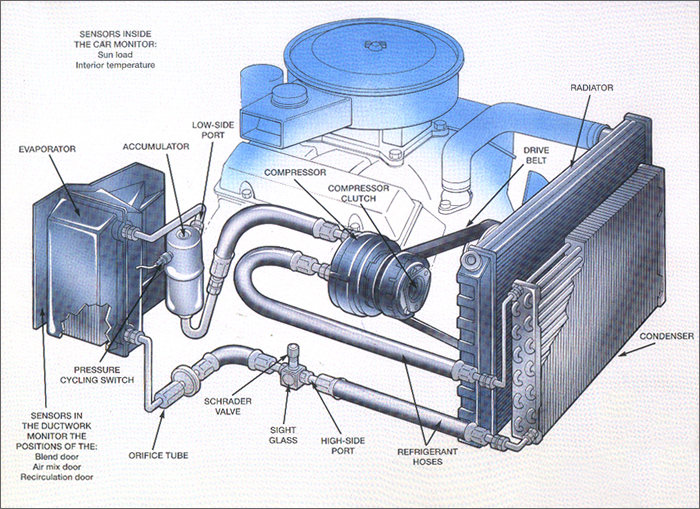Your Car's AC Condenser: The Cool Heart of Summer Comfort
Sweltering summer heat got you down? Imagine cruising down the highway on a scorching day, windows down, hair whipping in the wind – sounds idyllic, right? But in reality, that scenario quickly turns into a sweaty, uncomfortable mess. Thank goodness for the automotive air conditioning system, and at the heart of this system lies the often-overlooked hero: the car air conditioner condenser.
The car AC condenser is a vital component that plays a crucial role in keeping you cool and comfortable during hot weather drives. It's the unsung hero of summer road trips, transforming hot, humid air into a refreshing breeze. But how does this magical metal box actually work, and what happens when it starts to falter?
Think of the AC condenser as a heat exchanger, similar to a radiator, but instead of cooling engine coolant, it cools refrigerant. The refrigerant, a special fluid, circulates through the AC system, absorbing heat from inside your car and releasing it to the outside environment. This process is essential for maintaining a comfortable cabin temperature, especially in extreme heat.
Understanding the importance of a properly functioning car AC condenser goes beyond just comfort. A malfunctioning condenser can lead to decreased fuel efficiency, as the engine has to work harder to compensate for the increased strain on the cooling system. Furthermore, a faulty condenser can also contribute to environmental issues due to potential refrigerant leaks, which are harmful to the ozone layer.
From its early days as a luxury feature to its current status as a standard component in most vehicles, the automotive air conditioning system has undergone significant advancements. Early AC systems were bulky, inefficient, and expensive. However, with technological progress, car AC condensers have become smaller, more efficient, and more affordable, making cool comfort accessible to a wider range of drivers.
One of the most common issues with car AC condensers is leakage. Over time, the condenser can develop cracks or holes due to road debris, corrosion, or vibrations. These leaks can lead to a loss of refrigerant, reducing the cooling capacity of the system. Another frequent problem is blockage, which can occur due to accumulated dirt, debris, or insects, restricting airflow and hindering the condenser's ability to dissipate heat effectively.
The car air conditioner condenser is specifically designed to convert high-pressure, high-temperature refrigerant gas into a high-pressure, low-temperature liquid. This transformation is crucial for the cooling cycle, allowing the refrigerant to absorb heat from inside the car.
One benefit of a well-maintained car AC condenser is improved fuel efficiency. A properly functioning AC system puts less strain on the engine, resulting in better gas mileage. Another advantage is enhanced comfort, particularly during long drives in hot weather. A reliable AC system ensures a comfortable cabin temperature, reducing fatigue and enhancing the overall driving experience. Lastly, a healthy AC condenser contributes to a healthier environment by minimizing the risk of refrigerant leaks, which are harmful to the ozone layer.
To maintain your car AC condenser, regular inspections are crucial. Check for any signs of damage, leaks, or blockage. Cleaning the condenser regularly with a gentle stream of water can prevent the accumulation of dirt and debris. If you suspect any issues, consult a qualified mechanic for professional diagnosis and repair.
Advantages and Disadvantages of Modern Car AC Condensers
| Advantages | Disadvantages |
|---|---|
| Improved Fuel Efficiency | Can be Expensive to Repair/Replace |
| Enhanced Comfort | Susceptible to Damage from Road Debris |
| Environmentally Friendly (when properly maintained) | Requires Regular Maintenance |
Five Best Practices for Maintaining Your Car AC Condenser: 1. Regular Inspections, 2. Professional Servicing, 3. Cleaning the Condenser, 4. Addressing Leaks Promptly, 5. Using Quality Refrigerant.
Real-world examples of AC condenser issues include leaks due to road debris impact, blockage caused by insect nests, corrosion from road salt, and decreased cooling performance due to refrigerant loss.
Frequently Asked Questions: 1. How often should I have my car AC condenser inspected? 2. What are the signs of a failing AC condenser? 3. How much does it cost to replace a car AC condenser? 4. Can I clean my car AC condenser myself? 5. What type of refrigerant does my car use? 6. How can I prevent AC condenser leaks? 7. How long does a car AC condenser typically last? 8. What should I do if my AC is not blowing cold air?
Tips and tricks for maintaining your AC condenser include regularly inspecting for leaks, keeping the area around the condenser clean, and having the system professionally serviced at least once a year.
In conclusion, the car air conditioner condenser is an essential component for comfortable driving, especially during hot weather. Understanding its function, maintenance requirements, and potential issues can help you keep your cool on the road and extend the life of your AC system. From ensuring optimal performance to minimizing environmental impact, a properly functioning condenser provides numerous benefits. Regular maintenance and prompt attention to any issues are crucial for maximizing the lifespan and efficiency of your car's cooling system. By following the best practices outlined, you can enjoy comfortable and efficient cooling for years to come. Don't let the summer heat get the best of you – take care of your car AC condenser, and it will take care of you. Invest in its upkeep and enjoy the cool comfort it provides. Stay cool, drive safe, and enjoy the ride!
The subtle alchemy of purified water tds removal and its impact
Unlocking the magic santa beard pngs and transparency
Dive into the world of beautiful new world manga characters














